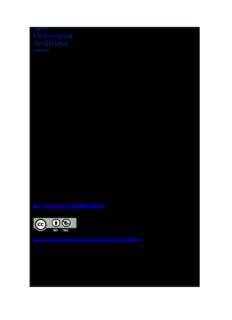
Experimental characterization and numerical simulation of composite adhesive joints using the PDF
Preview Experimental characterization and numerical simulation of composite adhesive joints using the
EXPERIMENTAL CHARACTERIZATION AND NUMERICAL SIMULATION OF COMPOSITE ADHESIVE JOINTS USING THE COHESIVE ZONE MODEL APPROACH Carlos Sarrado Molina Per citar o enllaçar aquest document: Para citar o enlazar este documento: Use this url to cite or link to this publication: http://hdl.handle.net/10803/384001 http://creativecommons.org/licenses/by-nc/4.0/deed.ca Aquesta obra està subjecta a una llicència Creative Commons Reconeixement- NoComercial Esta obra está bajo una licencia Creative Commons Reconocimiento-NoComercial This work is licensed under a Creative Commons Attribution-NonCommercial licence Doctoral thesis Experimental characterization and numerical simulation of composite adhesive joints using the cohesive zone model approach Carlos Sarrado Molina 2015 Escola Polit`ecnica Superior Dept. d’Enginyeria Mec`anica i de la Construcci´o Industrial Doctoral thesis Experimental characterization and numerical simulation of composite adhesive joints using the cohesive zone model approach Carlos Sarrado Molina 2015 Doctorate Program in Technology Advisors: Dr. Albert Turon Travesa Dr. Josep Costa Balanzat Universitat de Girona, Spain Universitat de Girona, Spain Thesis submitted for thedegree of Doctor of Philosophy by University of Girona Als meus pares, Antoni i MaCarmen, pel seu suport incondicional Acknowledgements In first place, I would like to express my gratitude to my thesis advisors, Dr. Albert Turon and Dr. Josep Costa. Their wise advice in our many profitable discussions has been one of the cornerstones of this thesis, but even more valuable has been the trusting and collaborative treating they have offered me. I also acknowledge the AMADE research group for giving me the chance to collaborate in many research projects during these years and for setting up a rich environment for the development of this thesis. During the development of this Ph.D. thesis, I have been given the op- portunity to perform two research stays. I would like to acknowledge Dr. Frank A. Leone and Dr. Carlos G. D´avila from NASA Langley Research Center (Hampton, VA, USA) and Dr. Joris J. C. Remmers from the Eind- hoven University of Technology (Eindhoven, The Netherlands) for giving me the opportunity to carry out these research stays and enriching the content of this thesis with useful discussions. No vull deixar d’agrair l’amistat i el suport rebut per part dels meus companys del grup de recerca AMADE. El seu tracte afable i proper acom- panyat d’un gran sentit de l’humor (cadascu´ a la seva manera, aix`o s´ı) han fet que aquest cam´ı hagi estat ple de bons moments dels quals en guardar´e sempre un gran record. El meu agra¨ıment m´es profund el dedico a la meva fam´ılia i amics. Amb tots ells he tingut la sort de gaudir de magn´ıfiques estones i sentir-me recolzatentotmoment. Enespecial,vullagrairlapaci`enciaielsuportdela meva dona, l’Alba, qui t´e la virtut, per a mi inprescindible, de dotar-me de confian¸ca en tot allo` que faig. Tamb´e vull agrair al meu germa` A`lex la seva i ii estima i els bons moments que m’ha fet passar des de ben petit, aix´ı com al meu oncle Joan, per esperonar-me en tot moment a seguir endavant en aquest cam´ı. Tinc clar que mai no podr´e agrair prou el suport que sempre m’han ofert els meus pares Antoni i Ma Carmen, aix´ı com els valors que han sabut inculcar-me i que conformen la persona que so´c avui. L’orgull que senten pel que faig aquestes poques - pero` imprescindibles - persones ´es un dels factors que m´es em motiven a continuar endavant. Finalment, vull recordar en aquestes l´ınies i expressar el meu agra¨ıment a la meva a`via Pepita. La seva ensenyanc¸a esta` reflectida en aquesta tesi, i el record dels seus consells de ben segur que romandr`a en tots aquells que vam tenir el plaer de gaudir-ne. Anyone who stops learning is old, whether at twenty or eighty. Anyone who keeps learning stays young. HenryFord iii The work contained in this Ph.D. thesis was conducted in the AMADE researchgroup(DepartmentofMechanicalEngineeringandIndustrialCon- struction, University of Girona, Spain). The thesis was carried out under the grant AP2010-0977 from the FPU program from the Spanish Ministe- rio de Educacio´n, Cultura y Deporte and partially funded by the Spanish Government through the Ministerio de Econom´ıa y Competitividad under the contracts DPI2012-34465 and MAT2012-37552-C03-03. Part of the research presented in this thesis was developed during the Ph.D. candidate’s stay at the NASA Langley Research Center (Hampton, VA, United States of America) and in the Eindhoven University of Tech- nology (Eindhoven, The Netherlands), which were respectively funded by AMADE research group of the University of Girona and the Spanish Min- isterio de Educacio´n, Cultura y Deporte through the grant EST13/00902.
Description: